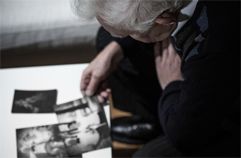
The Other Woman
Does the widower's new wife have a right to expect that her new husband be more devoted to her? Is it fair that she be haunted by the dead wife's presence?

Imagine driving up to your house…you park the car…you walk through the front door…and you are stopped by the feeling that you’re in the wrong house. You look around and everything’s been changed: the furniture, the wall hangings, the carpeting – none of it is what you knew growing up. It’s all alien to you. Reluctantly, you step into your mother’s kitchen, the source of so many loving memories, and then it’s a complete mess…spoiled food and dirty dishes are piled everywhere. Never once did your mother’s kitchen look like this!
This is an actual description of what people can go through after their parent’s divorce or one parent dies and remarries. The home you once knew gets “remodeled” to enable the new couple to kick off their new life together unencumbered by the past.
Sometimes the opposite occurs and the deceased spouse’s pictures and other belongings are kept exactly where they were when the person was alive. Perhaps he needs more time to mourn for his first wife but his new wife moves in and feels like there’s a “ghost” in the house. Everywhere she looks she  sees “her” and feels like “the other woman.” She is constantly reminded that this was a happy home before she came on the scene.
sees “her” and feels like “the other woman.” She is constantly reminded that this was a happy home before she came on the scene.
Add to this that he is still very close with his deceased wife’s parents and with her sister and husband and they still take vacations together at their jointly owned beach front property. If you were the second-marriage newcomer, what would you do?
On one hand, his new wife feels very loved by her husband and she feels very accepted by his first wife’s family, so she wants them to be a support for each other so they can mourn for their mutual loss; and at the same time, she wants to feel like she is so important to her new husband and that he would be willing to remodel the house and spend less time with his first wife’s parents and other family members.
What’s the proper thing to do in such a situation? Does the wife have a right to expect that her new husband be more devoted to her? Should his first wife’s family show compassion and begin to disengage themselves from the situation? Or, should the new wife understand that her husband is very attached to his in-laws and give him the space that he needs?
When we look at this situation with emuna, none of the above questions are relevant – they don’t apply at all. The only question here is what G-d wants. The only correct morality for this new bride is taking the actions that will bring her closer to G-d. The thoughts, feelings and actions that will bring her closer to G-d are the correct ones. The thoughts, feelings and actions that would take her further from G-d are the wrong ones. By following this simple prescription she will succeed in transforming this G-d given situation into what it is meant to become and in the process become her ultimate self.
In the final analysis, rather than feeling threatened by her predecessor, she was comforted by the thought that his first wife was happy that she had “taken her place.” She drew security from thinking that his first wife could see how much she loved her husband and how sensitive she was to his need to mourn at his own pace. In time, she felt a bond with the first wife and her family that exists till this day.







Tell us what you think!
Thank you for your comment!
It will be published after approval by the Editor.